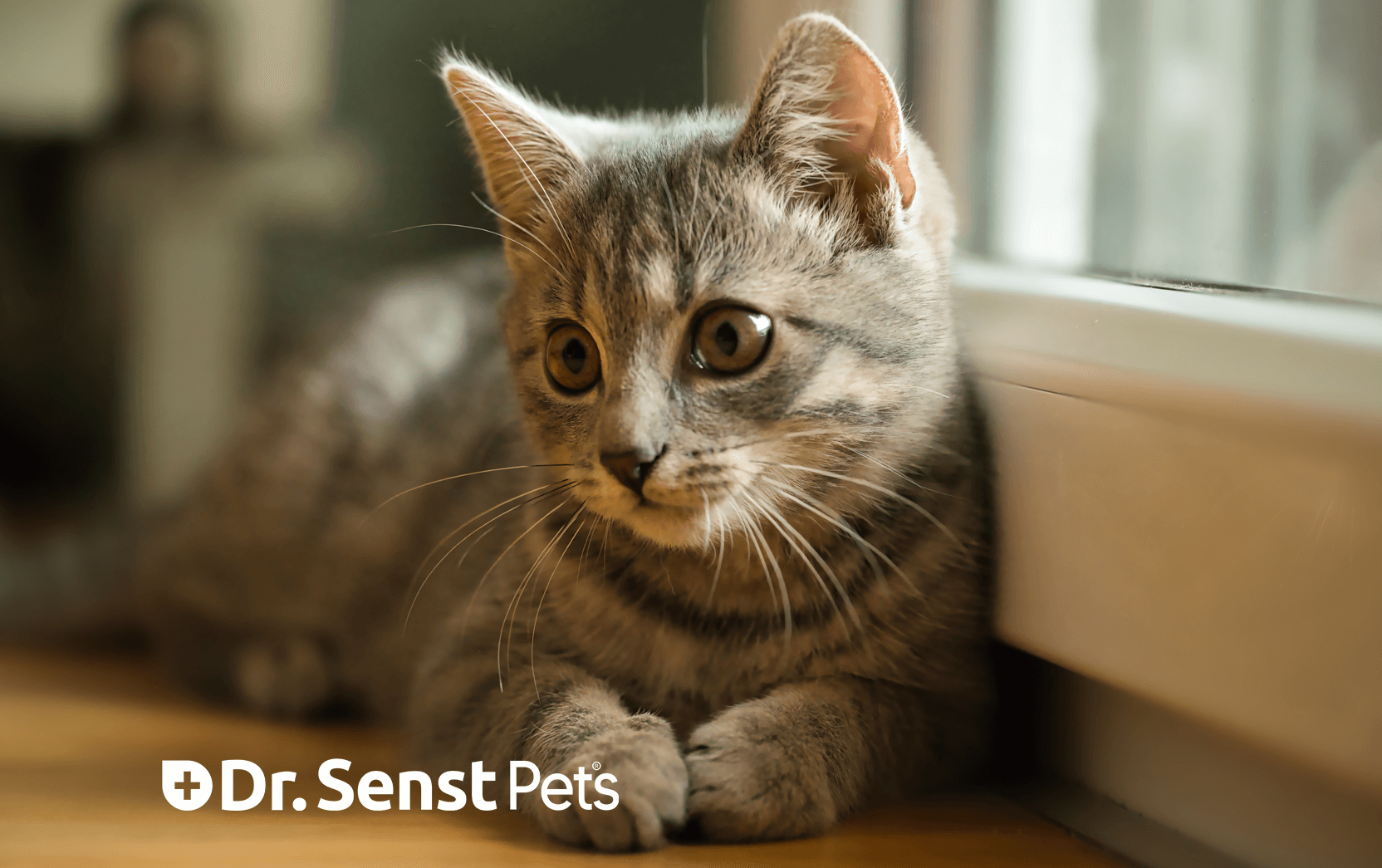
- by Dr.Thilo Senst
The Role of Probiotics in Managing Cat Diarrhoea and Loose Stools
- by Dr.Thilo Senst
A healthy gut is crucial for the overall well-being of your cat. One of the most common digestive issues pet owners encounter is diarrhoea or loose stools in cats, which can be caused by several factors, including diet changes, stress, or an underlying health issue. Fortunately, cat probiotics can play a key role in managing these symptoms and promoting a balanced digestive system. In this article, we will explore how probiotics help manage cat diarrhoea, their benefits, and tips for introducing probiotics into your cat's diet.
Diarrhoea in cats is characterised by frequent, loose, or watery stools and can be a sign of several health issues. It's essential to identify the underlying cause to address the problem effectively.
| Cause | Symptoms | Risk Factors |
|---|---|---|
| Sudden Dietary Changes | Loose stools, vomiting | Switching food abruptly |
| Food Allergies | Diarrhoea, vomiting, weight loss | Sensitivity to certain proteins |
| Stress | Loose stools, hiding, anxiety | Changes in environment |
| Infections (bacterial/viral) | Diarrhoea, lethargy, fever | Exposure to infected animals |
| Intestinal Parasites | Watery stools, bloating | Outdoor access or untreated infections |
Probiotics are live bacteria and yeasts that promote a healthy balance of gut flora. These beneficial microorganisms aid digestion and can help alleviate symptoms of diarrhoea by restoring balance in the digestive system.
Probiotics work by increasing the number of beneficial bacteria in your cat’s gut, helping to outcompete harmful pathogens. An imbalance in gut flora, known as dysbiosis, can lead to digestive issues like diarrhoea. Probiotics can help correct this imbalance, restoring a healthy gut environment.
Probiotics enhance the breakdown and absorption of nutrients from food, ensuring your cat’s digestive system functions more effectively. When your cat’s gut is healthy, they are less likely to experience loose stools and digestive discomfort.
A significant portion of your cat’s immune system resides in the gut. By supporting gut health, probiotics also boost the immune response, helping your cat fend off infections that could cause diarrhoea.
Probiotics can help reduce gut inflammation, especially in cases of inflammatory bowel disease (IBD). Reducing inflammation not only helps relieve diarrhoea but also improves your cat’s overall digestive health.
Think of your cat’s digestive system as a bustling city. In this city, there are both good and bad residents. The good residents (beneficial bacteria) keep everything running smoothly, while the bad ones (harmful bacteria) cause trouble when they become too numerous. Cat probiotics act as the “good police,” helping to maintain order by promoting the growth of beneficial bacteria while keeping harmful pathogens in check. By ensuring balance, probiotics help manage diarrhoea and prevent further digestive disruptions.
Introducing probiotics into your cat’s diet can offer a range of benefits, particularly for managing diarrhoea and promoting overall digestive health.
Probiotics can help resolve diarrhoea faster by restoring the natural balance of gut bacteria. This can be particularly helpful for cats with stress-related diarrhoea or those recovering from a dietary change.
When your cat’s digestive system is healthy, they can absorb more nutrients from their food, improving their overall health, coat quality, and energy levels.
Probiotics support the immune system by strengthening the gut barrier and preventing harmful bacteria from causing infections that may lead to diarrhoea or other illnesses.
By maintaining a healthy balance of gut flora, probiotics help prevent future episodes of diarrhoea and other digestive disturbances. This is especially important for cats with sensitive stomachs or those prone to stress.
Introduce probiotics gradually to avoid overwhelming your cat’s digestive system. Begin with a small dose and gradually increase it as your cat adjusts.
Look for probiotics specifically designed for cats, like Dr. Senst Cat Probiotic Supplements, to ensure the right balance of beneficial bacteria.
Keep an eye on your cat’s stools, appetite, and behaviour after introducing probiotics. If symptoms of diarrhoea persist or worsen, consult your vet for advice.
Q: How long does it take for probiotics to work in cats?
A: Probiotics can start improving your cat’s digestive health within a few days. However, it may take a week or more to see significant improvements in cases of chronic diarrhoea.
Q: Can I give my cat human probiotics?
A: It’s best to use probiotics formulated specifically for cats, as their digestive systems differ from humans. Products like Dr. Senst Cat Probiotic Supplements are designed to meet the unique needs of feline gut health.
Q: Are probiotics safe for all cats?
A: Yes, probiotics are generally safe for most cats. However, if your cat has a serious underlying condition, consult your vet before introducing probiotics.
Probiotics are an effective, natural solution for managing cat diarrhoea and promoting better gut health. Whether your cat is experiencing digestive issues due to dietary changes, stress, or an underlying health condition, adding probiotics to their routine can provide relief and support long-term well-being.
For cats prone to digestive problems, products like Dr. Senst Probiotic Supplements can offer the support they need to maintain a healthy digestive system. Pair these with other digestive health products like Dr. Senst Cat Calming Hemp Oil for Cats, which can help manage stress, and Dr. Senst Antiseptic Itchy Cats Spray, which is ideal for treating any skin irritation that may arise from poor digestion.
By taking a proactive approach to your cat’s gut health, you can ensure they live a happier, healthier life.
![]()
Enter your details & download our comprehensive 50+ page printable Dr. Senst Pet Care Planner completley FREE! - keep track of all your pet’s needs, from medical history and training to vet visits, grooming, diet, and more!










Share:
How to Detect and Treat Fungal Ear Infections in Dogs
Top Cat Anti-Itch Sprays: Choosing the Best for Your Feline